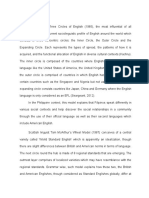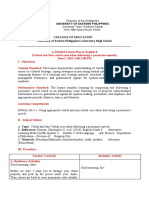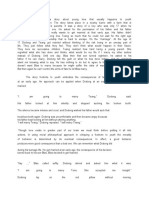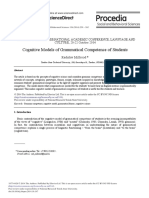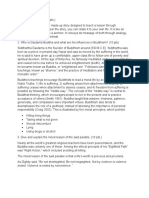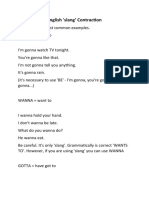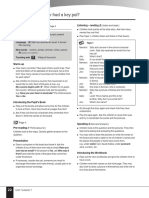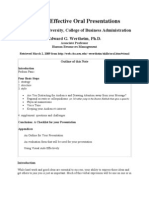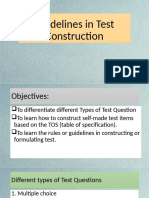0 ratings0% found this document useful (0 votes)
112 viewsThere Are Four Types of English Sentence, Classified by Their Purpose
There Are Four Types of English Sentence, Classified by Their Purpose
Uploaded by
Jayshri HuddarThere are four main types of sentences in English: declarative sentences (statements), interrogative sentences (questions), imperative sentences (commands), and exclamative sentences (exclamations). Declarative sentences make statements and usually end with a period. Interrogative sentences ask questions and always end with a question mark. Imperative sentences give commands or requests and usually end with a period. Exclamative sentences express strong emotions like surprise and always end with an exclamation point.
Copyright:
© All Rights Reserved
Available Formats
Download as DOCX, PDF, TXT or read online from Scribd
There Are Four Types of English Sentence, Classified by Their Purpose
There Are Four Types of English Sentence, Classified by Their Purpose
Uploaded by
Jayshri Huddar0 ratings0% found this document useful (0 votes)
112 views4 pagesThere are four main types of sentences in English: declarative sentences (statements), interrogative sentences (questions), imperative sentences (commands), and exclamative sentences (exclamations). Declarative sentences make statements and usually end with a period. Interrogative sentences ask questions and always end with a question mark. Imperative sentences give commands or requests and usually end with a period. Exclamative sentences express strong emotions like surprise and always end with an exclamation point.
Original Title
FOUR KINDS OF SENTENCES
Copyright
© © All Rights Reserved
Available Formats
DOCX, PDF, TXT or read online from Scribd
Share this document
Did you find this document useful?
Is this content inappropriate?
There are four main types of sentences in English: declarative sentences (statements), interrogative sentences (questions), imperative sentences (commands), and exclamative sentences (exclamations). Declarative sentences make statements and usually end with a period. Interrogative sentences ask questions and always end with a question mark. Imperative sentences give commands or requests and usually end with a period. Exclamative sentences express strong emotions like surprise and always end with an exclamation point.
Copyright:
© All Rights Reserved
Available Formats
Download as DOCX, PDF, TXT or read online from Scribd
Download as docx, pdf, or txt
0 ratings0% found this document useful (0 votes)
112 views4 pagesThere Are Four Types of English Sentence, Classified by Their Purpose
There Are Four Types of English Sentence, Classified by Their Purpose
Uploaded by
Jayshri HuddarThere are four main types of sentences in English: declarative sentences (statements), interrogative sentences (questions), imperative sentences (commands), and exclamative sentences (exclamations). Declarative sentences make statements and usually end with a period. Interrogative sentences ask questions and always end with a question mark. Imperative sentences give commands or requests and usually end with a period. Exclamative sentences express strong emotions like surprise and always end with an exclamation point.
Copyright:
© All Rights Reserved
Available Formats
Download as DOCX, PDF, TXT or read online from Scribd
Download as docx, pdf, or txt
You are on page 1of 4
The 4 English Sentence Types
There are four types of English sentence, classified by their purpose:
declarative sentence (statement)
interrogative sentence (question)
imperative sentence (command)
exclamative sentence (exclamation)
Sentence types
form function exampl final
e punctuatio
sentenc n
e
(clause)
1 declarative statement: It tells us John
something likes .
Mary.
2 interrogative question: It asks us something Does
Mary ?
like
John?
3 imperative Advice/request/command/ord Stop.
er: It tells us to do something Close .
the
door.
4 Exclamative/exclamato exclamation: It expresses What a
ry surprise/feelings funny !
story he
told us!
(form = structure / function = job)
1. Declarative Sentence (statement)
Declarative sentences make a statement. They tell us something. They give
us information, and they normally end with a full-stop/period.
The usual word order for the declarative sentence is:
subject + verb...
Declarative sentences can be positive or negative. Look at these examples:
positive negative
I like coffee. I do not like coffee.
We watched TV last night. We did not watch TV last night.
Declarative sentences are the most common type of sentence.
2. Interrogative Sentence (question)
Interrogative sentences ask a question. They ask us something. They want
information, and they always end with a question mark.
The usual word order for the interrogative sentence is:
(wh-word +) auxiliary/helping verb + subject + verb...
What, which, who, whose, where, whom, when, how, why
Verb -word/auxiliary/helping verb-am, is, are, was, were, have, has,
had, do, does, did, shall ,should, will, would, can, could
Auxiliary /helping verb + subject+ verb…
Interrogative sentences can be positive or negative. Look at these
examples:
positive negative
Do you like coffee? Don't you like coffee?
Why did you go? Why didn't you go?
3. Imperative Sentence
(command/advice/order/request)
they end with a full-stop/period (.)
since the subject is YOU never use IS,HAS,DOES & verb+s/es
The usual word order for the imperative sentence is:
base form/verb(present tense)...
Note that there is usually no subject—because the subject is understood, it
is YOU.
Imperative sentences can be positive or negative. Look at these examples:
positive negative
Stop! Do not stop!
Give her coffee. Don't give her coffee.
4. Exclamative/ Exclamatory Sentence (exclamation)
Exclamative sentences express strong emotion/surprise—an exclamation—
and they always end with an exclamation mark/point (!).
The usual word order for the exclamative sentence is:
What (+ adjective) + noun + subject + verb
How (+ adjective/adverb) + subject + verb
Look at these examples:
What a liar he is!
What an exciting movie it was!
How he lied!
How exciting the movie was!
The subject of the sentence is what (or whom) the sentence is about.
In the sentence “The cat is sleeping in the sun,” the word cat is the
subject.
A predicate is the part of a sentence, or a clause, that tells what the
subject is doing or what the subject is. Let’s take the same sentence
from before: “The cat is sleeping in the sun.” The clause sleeping in
the sun is the predicate; it’s dictating what the cat is doing.
You might also like
- Br2e Int SB Practicefile AnswersDocument4 pagesBr2e Int SB Practicefile AnswersLe Dinh Thinh100% (1)
- Case No 1 Jim Is Your Trusted AssistantDocument2 pagesCase No 1 Jim Is Your Trusted AssistantImrul Studio100% (1)
- Written Report of Current Trends and Issues in Materials DevelopmentDocument4 pagesWritten Report of Current Trends and Issues in Materials DevelopmentLlego, Rhiomeiza A.No ratings yet
- Theoretical Framework For American and British EnglishesDocument3 pagesTheoretical Framework For American and British EnglishesRegine Arribe NicolasNo ratings yet
- Ocean at The End of The Lane Teaching GuideDocument17 pagesOcean at The End of The Lane Teaching GuideAlaina Green100% (2)
- CMN 432 Major Research Project - FINALDocument11 pagesCMN 432 Major Research Project - FINALgbc0510No ratings yet
- Bsee 24 Lesson 1 Theories of Origin of Human Language Bow-Wow TheoryDocument8 pagesBsee 24 Lesson 1 Theories of Origin of Human Language Bow-Wow TheoryRenier ArceNoNo ratings yet
- Old English WordsDocument1 pageOld English Words6684626No ratings yet
- Final LP in Final DemoDocument8 pagesFinal LP in Final DemoJang YoungNo ratings yet
- Dialects, Sociolects, Registers. Learning Outcomes:: Language, Dialect, and RegisterDocument27 pagesDialects, Sociolects, Registers. Learning Outcomes:: Language, Dialect, and RegisterJulius MacaballugNo ratings yet
- Module 1 MC Elt 3Document24 pagesModule 1 MC Elt 3Inah Mae Villareal RentoriaNo ratings yet
- How The World and Mankind Were CreatedDocument1 pageHow The World and Mankind Were CreatedKelly Camille AlairNo ratings yet
- TL of Language Culture and Society EXAMDocument3 pagesTL of Language Culture and Society EXAMFaith Lanie LumayagNo ratings yet
- Dead StarsDocument10 pagesDead StarsKaly RieNo ratings yet
- EFN2 - MrNur - Reading Techniques and StrategiesDocument27 pagesEFN2 - MrNur - Reading Techniques and StrategiesRoikhatul Masithoh100% (1)
- Eighteen Challenges in Contemporary LiteratureDocument7 pagesEighteen Challenges in Contemporary LiteratureKarisNo ratings yet
- English 7 DLLDocument50 pagesEnglish 7 DLLrobinaNo ratings yet
- SLA Whole Summary-VivaDocument37 pagesSLA Whole Summary-Vivafarabi nawarNo ratings yet
- Biag Ni Lam-AngDocument15 pagesBiag Ni Lam-AngWendangx Serrano0% (1)
- DepEd No. 53 Series of 1987Document11 pagesDepEd No. 53 Series of 1987Mart Albert ReborteraNo ratings yet
- Language EssayDocument4 pagesLanguage Essayapi-235562181No ratings yet
- College of Education University of Eastern Philippines Laboratory High SchoolDocument6 pagesCollege of Education University of Eastern Philippines Laboratory High SchoolYusef John NebridaNo ratings yet
- Behaviorist Learning TheoryDocument2 pagesBehaviorist Learning TheoryBadine De LeonNo ratings yet
- Chapter 5 Typical and Atypical Development Among Children Angilyn de AsisDocument82 pagesChapter 5 Typical and Atypical Development Among Children Angilyn de AsisAngilyn De AsisNo ratings yet
- Footnote To YouthDocument3 pagesFootnote To YouthJenelyn Amil100% (1)
- Lesson Plan in Grade 8 Yin and YangDocument5 pagesLesson Plan in Grade 8 Yin and YangQuennie EscuetaNo ratings yet
- Bilingual ReportDocument11 pagesBilingual ReportEph Fur100% (1)
- Language and Social ClassDocument27 pagesLanguage and Social ClassIdrees BharatNo ratings yet
- A FILIPINO CANDIDATE IN HAWAII by JawpieDocument1 pageA FILIPINO CANDIDATE IN HAWAII by JawpieSonza CastilloNo ratings yet
- Language Policies in PHDocument41 pagesLanguage Policies in PHWinterMae BacalsoNo ratings yet
- Third Powerpoint PresentationDocument20 pagesThird Powerpoint PresentationPatrick TingsonNo ratings yet
- Five Traits of Technical WriitngDocument18 pagesFive Traits of Technical WriitngNINETTE TORRESNo ratings yet
- DeclamationDocument11 pagesDeclamationRoland V. MarianoNo ratings yet
- Technical WritingDocument33 pagesTechnical WritingJames Raphael ArnilloNo ratings yet
- LING7Document34 pagesLING7Dona Dela Peña MinguitoNo ratings yet
- Tangkilikin Ang Sariling Atin - Presence of Colonial Mentality AmoDocument8 pagesTangkilikin Ang Sariling Atin - Presence of Colonial Mentality AmodoguejayroquenNo ratings yet
- Discourse Analysis Activity No. 1 PDFDocument4 pagesDiscourse Analysis Activity No. 1 PDFJoel T. Fernandez0% (1)
- 8 Methods in Teaching GrammarDocument29 pages8 Methods in Teaching GrammarJenjen GammadNo ratings yet
- Dead Stars by Paz MarquezDocument11 pagesDead Stars by Paz MarquezSamantha CalucagNo ratings yet
- Grammatical Competence TheoryDocument4 pagesGrammatical Competence TheorySheryl NatinoNo ratings yet
- Assignement 2Document3 pagesAssignement 2Ma Vanessa Rose TacuyanNo ratings yet
- Modes For Teaching Grammar Topic TuesdayDocument5 pagesModes For Teaching Grammar Topic TuesdayShaira Mae AlimpolosNo ratings yet
- DLP10 Cases of PronounDocument3 pagesDLP10 Cases of PronounRodmar Escolano100% (1)
- A Service of Love Final LPDocument6 pagesA Service of Love Final LPFone LineNo ratings yet
- Effects of Code SwitchingDocument46 pagesEffects of Code SwitchingReycel IlawanNo ratings yet
- The Activities For Audiolingual The Method Is Distinctively Various in Its ApplicationDocument2 pagesThe Activities For Audiolingual The Method Is Distinctively Various in Its ApplicationELI KUSUMANo ratings yet
- STRUCTURE OF COMPLEMENTATION and COORDINATIONDocument13 pagesSTRUCTURE OF COMPLEMENTATION and COORDINATIONkrishannvNo ratings yet
- Eng 124 - Unit 2 L 4-6Document20 pagesEng 124 - Unit 2 L 4-6Elrose Saballero KimNo ratings yet
- Chapter 2 and Significance of The Study REVISEDDocument15 pagesChapter 2 and Significance of The Study REVISEDBryce Alryk AgdipaNo ratings yet
- Lesson Plan Arts and Creativity LiteracyDocument7 pagesLesson Plan Arts and Creativity LiteracyChristine Mae BacomoNo ratings yet
- ILAO MidtermsDocument2 pagesILAO MidtermsPrincess Fritz IlaoNo ratings yet
- Role of A Teacher in Society Updated Autosaved 3Document15 pagesRole of A Teacher in Society Updated Autosaved 3Janette PanteNo ratings yet
- Quezon SpeechDocument5 pagesQuezon SpeechAnaliza SarmientoNo ratings yet
- TTL 2 Bsed 3 Montano Prelim ModuleDocument16 pagesTTL 2 Bsed 3 Montano Prelim ModuleApril Love C Lambaco100% (1)
- Text, Context, SubtextDocument14 pagesText, Context, SubtextChristian Loyd BalayoNo ratings yet
- 8improvisation and Creative DramaDocument23 pages8improvisation and Creative DramaKlenn Andrea DimalibotNo ratings yet
- Defining Emergent Literacy: Developing Lifelong ReadersDocument2 pagesDefining Emergent Literacy: Developing Lifelong ReadersSantiago Jr KadusaleNo ratings yet
- Teaching and Assessing Speaking 1Document9 pagesTeaching and Assessing Speaking 1dychavezramseyNo ratings yet
- Lit10 LCDocument14 pagesLit10 LCGrace Marie Cervantes0% (1)
- The Influence of Social Media in Developing The Language Competence of Sophomore Ab English Students of Polytechnic University of The PhilippinesDocument3 pagesThe Influence of Social Media in Developing The Language Competence of Sophomore Ab English Students of Polytechnic University of The Philippineslendiibanez100% (1)
- Structure of EnglishDocument39 pagesStructure of EnglishEd-Jay RoperoNo ratings yet
- Sample Module Creative Drama Activities For Classroom UseDocument7 pagesSample Module Creative Drama Activities For Classroom UseLORD IVAN BERNABENo ratings yet
- A Brief History of Badminton from 1870 to 1949From EverandA Brief History of Badminton from 1870 to 1949Rating: 3.5 out of 5 stars3.5/5 (2)
- MATH267L3 Seq SeriesDocument11 pagesMATH267L3 Seq SeriesJayshri HuddarNo ratings yet
- Online Workshop On Mathematical Sciences For Csir-Net/Set/GateDocument95 pagesOnline Workshop On Mathematical Sciences For Csir-Net/Set/GateJayshri HuddarNo ratings yet
- English Slang ContractionsDocument8 pagesEnglish Slang ContractionsJayshri HuddarNo ratings yet
- Class Notes PDF Chapter 5 Continuity and Differentiability Class 12 Maths Toppers VillageDocument135 pagesClass Notes PDF Chapter 5 Continuity and Differentiability Class 12 Maths Toppers VillageJayshri HuddarNo ratings yet
- LRN Level B2 January 2017 Past PaperDocument19 pagesLRN Level B2 January 2017 Past Papernota3256% (9)
- Lesson 3 Ni Jiao Shenme MingziDocument3 pagesLesson 3 Ni Jiao Shenme MingziLovely dela RosaNo ratings yet
- Commissionerate of Collegiate Education JKC Monitoring Cell: Student S Workbook (Communication Skills)Document208 pagesCommissionerate of Collegiate Education JKC Monitoring Cell: Student S Workbook (Communication Skills)Lakshmi Prasad CNo ratings yet
- Research TopicDocument27 pagesResearch TopicAhsanNo ratings yet
- Identifying Implicitly and Explicitly: Stated InformationDocument16 pagesIdentifying Implicitly and Explicitly: Stated InformationAriza AlvarezNo ratings yet
- Day in Day Out! Unit 3Document16 pagesDay in Day Out! Unit 3Despina PassaliNo ratings yet
- UNIT 10 Basic 2 Present Perfect vs. Simple Past Plus PracticeDocument3 pagesUNIT 10 Basic 2 Present Perfect vs. Simple Past Plus PracticeMaria CarmenNo ratings yet
- NURS274 Research 3Document4 pagesNURS274 Research 3Julian HernandezNo ratings yet
- The Grammar of Interpersonal Meaning: MOOD: By: Avinahari Ahidatur R (2109160) LUTFI NUR AFIFAH (210916029) AmilaDocument44 pagesThe Grammar of Interpersonal Meaning: MOOD: By: Avinahari Ahidatur R (2109160) LUTFI NUR AFIFAH (210916029) Amilanur qoniahNo ratings yet
- Module 2b: Subjective Tests Objective:: Various WaysDocument13 pagesModule 2b: Subjective Tests Objective:: Various WaysRHIZZA MAE BONGHANOY HITOSISNo ratings yet
- June 2021 Mark Scheme Paper 21Document12 pagesJune 2021 Mark Scheme Paper 21Sri NethraNo ratings yet
- SK RPT Bahasa Inggeris Tahun 2 (Edited)Document12 pagesSK RPT Bahasa Inggeris Tahun 2 (Edited)Mohd 'piske' HafizNo ratings yet
- Ivy Tech Community College: SOC 111 Introduction To SociologyDocument7 pagesIvy Tech Community College: SOC 111 Introduction To SociologyNIkolai CastilloNo ratings yet
- Questiontags: 1. A Tag Question Is A Short Question (E.G. Have You? / Haven'T You?) ThatDocument3 pagesQuestiontags: 1. A Tag Question Is A Short Question (E.G. Have You? / Haven'T You?) Thatbenny syaputraNo ratings yet
- Communicative Competence Quiz For PurpcommDocument2 pagesCommunicative Competence Quiz For PurpcommpalomarpixieNo ratings yet
- Tugas Bahsa InggrisDocument8 pagesTugas Bahsa InggrisShinta DewiNo ratings yet
- Way Ahead TB Sample Unit 1 Level 206Document5 pagesWay Ahead TB Sample Unit 1 Level 206Rafik DjezzarNo ratings yet
- Making Effective Oral PresentationsDocument12 pagesMaking Effective Oral PresentationsMing NguyenNo ratings yet
- Vihsadas's Verbal StrategyDocument11 pagesVihsadas's Verbal StrategythalianguyenNo ratings yet
- English f1 Module (COMPILATION)Document20 pagesEnglish f1 Module (COMPILATION)AHDEARNo ratings yet
- 10 Steps To Successful PresentationsDocument87 pages10 Steps To Successful PresentationsSaravanakumar_INo ratings yet
- Mark Scheme For Some Test Paper AlevelsDocument62 pagesMark Scheme For Some Test Paper AlevelsSexy BeastNo ratings yet
- Guidelines in Test Construction Group 3 PDFDocument77 pagesGuidelines in Test Construction Group 3 PDFNonie Beth CervantesNo ratings yet
- Latest Form 1 Lesson Plan (Cefr/kssm English Daily Lesson Plan) RPH Bahasa Inggeris Sekolah Menengah Tingkatan 1 TerkiniDocument3 pagesLatest Form 1 Lesson Plan (Cefr/kssm English Daily Lesson Plan) RPH Bahasa Inggeris Sekolah Menengah Tingkatan 1 Terkinierfolg.prominenceNo ratings yet
- 3 ModuleDocument11 pages3 ModuleIndah safitriNo ratings yet
- Lesson Plan Tasty Freeze and Changing MaterialsDocument5 pagesLesson Plan Tasty Freeze and Changing Materialsapi-320515884No ratings yet



